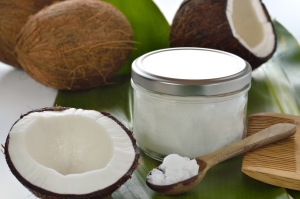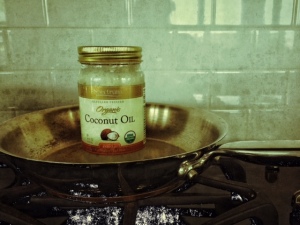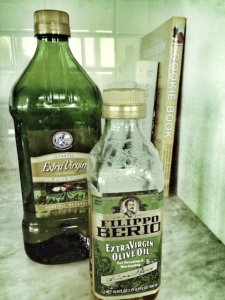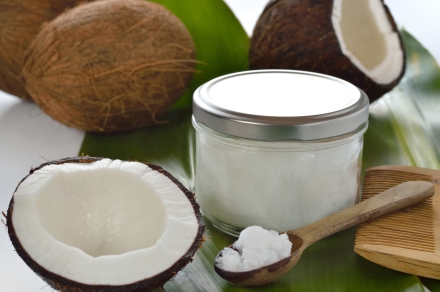 When my mother-in-law informed me that coconut oil was part of her new diet plan, and my husband announced that he wanted to try a coconut oil chicken recipe from a men’s health magazine, I began to wonder if olive oil really should get the boot from a new-found “healthier” option. Instead of joining the coconut oil craze, I decided to do some hardcore research on the subject for myself-Nothing better than a little reading on the organics and biochemistry of fats!
When my mother-in-law informed me that coconut oil was part of her new diet plan, and my husband announced that he wanted to try a coconut oil chicken recipe from a men’s health magazine, I began to wonder if olive oil really should get the boot from a new-found “healthier” option. Instead of joining the coconut oil craze, I decided to do some hardcore research on the subject for myself-Nothing better than a little reading on the organics and biochemistry of fats!
Plain and simple, coconut oil is a FAT! It is not a weight loss food. It has the same amount of calories as any other fat. Yes, it is a better option than butter and other trans fats because it doesn’t contain any cholesterol, but it doesn’t beat olive oil or other plant-based oils. In fact, coconut oil can still potentially increase your risk for heart disease because it is high in saturated fat (the “bad” kind of fat that you should avoid in your daily diet). Not only is it high in saturated fat…it has the HIGHEST amount of saturated fat of any fat at 92%. I am not saying to avoid all fat in your diet. Fat is necessary for our bodies to function, but in the right daily amounts.
So, why the “Craze”? Does coconut oil really cure cancer, lead to immediate weight loss, and give you a fool-proof immune system? If only! Coconut oil is an interesting little fat. Although it is high in saturated fat and should be limited in the diet for this reason, it does have some unique properties that may offer some health benefits. Coconut oil is made up of fatty acids. Unlike other fats, the main contributors are a mix of short and medium chain fatty acids, predominantly lauric and myristic acids. It is thought that this mixture may be the reason why coconut oil actually helps to increase HDL (or good cholesterol) in the body. Even though it may give your good cholesterol a strong boost, it will also increase your LDL (or BAD cholesterol). Another positive of coconut oil is its plant-based origin. Plant based products offer antioxidant properties, and coconut oil probably also contains some healthy chemicals that researchers haven’t yet identified. Studies are currently looking at coconut oil’s impact on Alzheimer’s and other diseases, but it is far too early to say that it is a “cure-all”.
So, although it may be tempting to dump your olive oil down the drain, DON’T DO IT! Olive Oil is still a healthier fat option for your heart and your waistline as far as we know. It’s okay to use coconut oil every now and then for a flavorful treat, but DON’T make it your “go to” fat. If you love to bake and are looking for a healthier alternative to butter, then coconut oil is a good alternative. This won’t make your double chocolate chip cookies low-fat, but it might make them just a little bit healthier!
Check out the hyperlinks for more supporting evidence from Harvard, The Cleveland Clinic, and Johns Hopkins.
From The Mom in Me, MD


Coconut Oil and Cooking:
– smoke point
One of the major reasons for coconut oil use in cooking from a functional perspective is the smoke point compared to olive oil. The higher the smoke point the less likely those eating will get oxidized oil, which can contribute cardiovascular disease. Avocado oil has the highest smoke point at around 500F (if memory serves me right).
Weight loss and Energy:
First, the research in “The Calorie Myth” does a solid job of showing calories aren’t making us fat. If that were true then a can of coke vs. an avocado would win the day.
Second, the rational for Medium Chain Triglycerides (as in Coconut Oil) as a valuable Energy Source vs. Long-chain is basic biochemistry. MCT’s require less energy to extract energy from them.
This is the simple version: http://nutritionreview.org/2013/04/medium-chain-triglycerides-mcts/
More complete info:
http://m.jn.nutrition.org/content/132/3/329.full
What about weigh loss:
Since fats are essential for making you feel full they are an important aspect of diet. But MCT’s are unique in that they provide the same feeling of fullness while providing you more efficient energy.
But the 3rd reason is most unique, they are less likely to become fat on your body and it actually increases thermogenesis.
http://www.sciencedirect.com/science/article/pii/0026049589901017
The last thing I’ll mention about coconut oil is that when you look at cultures that consume the most coconut oil as a percentage of their diet they see the least amount of heart disease.
I won’t get into the saturated fat and cholesterol misinformation of the last 30 years, but let’s just say that the hatred towards these 2 components have seen unscientific fear against them.
What tends to happen with people when they read nutrition research is they become pharmaceutical in their thinking…while food does have drug-like effects on body structure and function it must be in the context of your entire food matrix (what you eat throughout your day).
There are no silver bullets, but coconut oil has qualities that are better than it’s long-chain counterparts.
Hey Cico! Thanks for the thoughts. Thanks for bringing up the SMOKE POINT. I didn’t address that in my article, and it probably would have been useful info for everyone. Smoke point is important, and it does indicate when you should use which type of oil. Some oils do better at lower temperatures than others. Once an oil or fat has reached its smoke point (the point at which it starts smoking) it starts to break down the amino acids. Thus, it is better to use a variety of oils and fats depending on how you are cooking. Although I pointed out olive oil as a good option for cooking, Cico is correct that it doesn’t have the highest Smoke Point unless you use a light olive oil or one that is highly refined. Oils and fats with high smoke points are best used for searing, deep frying, or browning. Avocado and almond oil fall into this High smoke point category. Medium high smoke point oils are best for baking, oven cooking and stir-frying. Olive oil falls into this category. Medium smoke point are best for light sautéing, sauces, and lower heat. I am attaching a list from the Cleveland Clinic that shows which category many common oils fall into. http://health.clevelandclinic.org/2012/05/heart-healthy-cooking-oils-101/
Regarding calories…I agree that all calories are not created equal. An avocado is a much healthier source of calories and fat than french fries. 200 calories from avocado does not equal 200 calories from fries. However, calories are still a good way to measure our intake, but they are not the whole story. Too many people count calories to lose weight but then allow themselves to eat non-nutritive foods that have no health benefits and which may actually be harmful to their bodies. A healthy diet is one focused on real foods such as fruits, vegetables, nuts, grains, meats and dairy (if you aren’t vegan), and water. Fat is an essential component to any diet. It just needs to be the right amount. Cutting out all fat can be detrimental to your metabolism and your health. Eating only low fat foods may also push you to consume more food, foods high in sugar and foods high in empty carbohydrates.
Again, I’m not anti coconut oil. I actually love the flavor of coconut. I think it probably has some great health benefits, but when I start reading diet plans that incorporate its use several times a day every day, I get a little concerned that this may not be the healthiest option. Using a variety of oils is the best option. Coconut oil can be one of them, but it should be used with an awareness that it is still a fat.